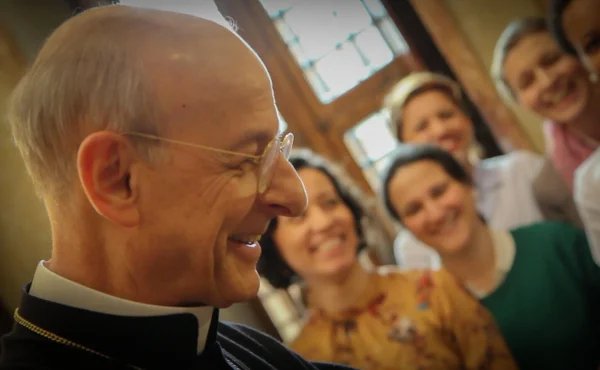You recently celebrated the 50th anniversary of your priestly ordination. What do you remember about the beginning of your journey as a priest?
I remember especially how much it impressed me to be able to celebrate Holy Mass every day. Afterwards, I have not stopped asking our Lord that I never get used to that experience, even if it is no longer something new, as it was then. It was Saint Josemaría who welcomed my call to the priesthood, and therefore I often turn to him to ask him for my priestly ministry and for the happiness and fruitfulness of all the world’s priests.
How would you briefly define the Opus Dei that you lead today?
Opus Dei is an institution in the Church that tries to sow the peace and joy of Christ in the middle of the world. With our mistakes and successes, we seek to bring Christ to family, professional and social environments. The Work would like to be a great “catechesis” for many people, in union with that carried out by the parishes and so many other institutions in the Church.
Who are Opus Dei's greatest enemies today?
The main enemy is not external, but internal. I am referring to the danger of worldliness, because the faithful of Opus Dei live immersed in the realities of the world, a largely de-Christianized world, and we are not immune to a possible loss of spiritual vigor. Those who are externally opposed to Opus Dei in one way or another are not enemies for me. Often they are surely uninformed people, who do not understand the spirit that animates Opus Dei, or people who help us to be better with their criticism, when it is well-founded.
Despite this criticism, Opus Dei continues to attract many men and women.
Yes, but naturally I would like many more people to be willing to bring Christ’s Church to every sector of Croatia and the world, not only through Opus Dei but also through so many other evangelizing groups that flourish in the Church.
What is Opus Dei’s response to the current crisis of neglect and abandonment of the faith?
A key element is spiritual accompaniment and guidance of souls, one by one, being good friends, with great respect for everyone’s freedom. If we see in the society around us only an undifferentiated mass of people, we may have little Christian vision. Each person is loved by God and deserves all the Church’s respect and attention, because Christ has died for each one. A main point is helping people to appreciate the treasure of the sacraments, especially the Eucharist and Penance.
How do you view the crisis caused by the coronavirus?
I see it as a call to live for others, in a spirit of human solidarity and Christian charity. The pandemic, as the Pope has said, reminds us that no one is saved alone, that we depend on each other and that we all have a role in the shared task of caring for the world.
The Prelature that you lead answers directly to the Holy Father. How do you view the role of Pope Francis in today’s world?
In reality, not only the faithful of Opus Dei, but all Catholics depend directly on the Pope, although they also depend on other parts of the Church. On the other hand, our dependence on the Pope, like that of so many other communities of faithful in the Church, is mediated by the Congregation for Bishops and other bodies of the Holy See.
As for the role of the Pope, going back to what I said before, I think that in this world now when the pandemic forces us to question so many things, his fatherly presence is more necessary than ever. For example, many people have told me about the impact made on them by the image of the empty Saint Peter’s Square and the Pope comforting and blessing everyone as Christ’s Vicar.
Pope Francis has critics in the Church itself. Can believers criticize the Pope?
History teaches us that all pontificates have undergone moments of strong criticism, for one reason or another. Regarding your question about the legitimacy of criticism, I would tell you with our founder, Saint Josemaría, that we always need to love and not criticize the Pope, the Vicar of Christ, whoever he may be.
In August, you visited Croatia, among other places. What was the purpose of your visit and your message for the people you saw in Zagreb?
This was one of my first pastoral trips since the start of the pandemic. The main purpose was to be with the people of the Prelature. I didn’t go to Croatia to transmit a special message, but to accompany the people there, although of course I have shared with them some of the concerns I carry in my heart. I have spoken to them about love for the Church and the Pope, union with the bishops, perseverance in the faith, the apostolic mission all Christians share in, and, in this context, the value of friendship, and so many other things that came up in family conversations. I encouraged everyone to be very grateful to God for the gift of faith and to give witness, at work and in daily life, to the joy of having found Christ.
